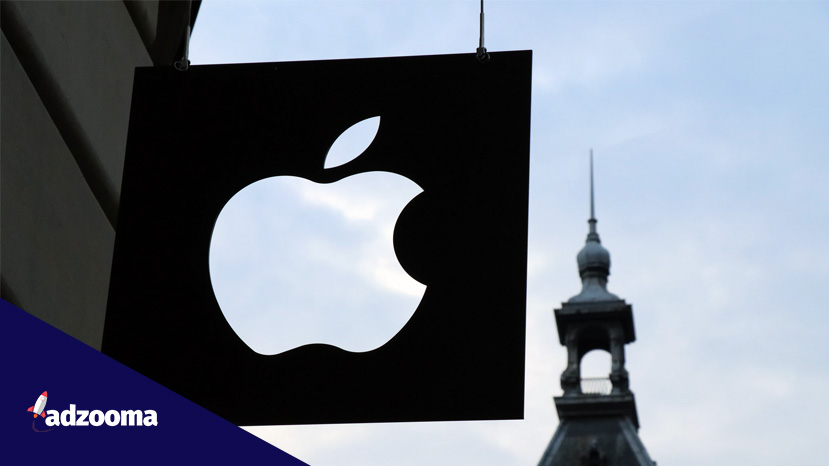As a huge corporation, Apple is a central player in the battle of the tech giants – all of which seem to have ulterior motives.
Let’s take a look at what’s recently gone down, who with and what it means for advertisers.
Apple vs. advertisers
The new IOS 14 update to hit iPhones has shaken the advertising world. Those with the new phone software will now be given the option to opt-out of tracking on other apps and websites. For most users, it’ll be a no brainer as user privacy is constantly a hot topic. However, this is worrying for advertisers who make a lot of money from user data.
Whilst Apple considers this a huge win for user privacy, the loss of this data means ad personalisation is no longer possible. Facebook has reacted by saying that this will create a big problem for developers and publishers as it saw a 50% revenue decrease when personalisation was removed from in-app Audience Network campaigns. This is true for any other company that utilises app tracking, such as Google (who are also kiboshing third-party cookies) so the foundations of ad functionality are set to change forever.
Apple has never been known for exploiting its users’ data, something which was emphasised in the wake of the Cambridge Analytica scandal by their CEO; Tim Cook stated Apple would never monetise customer information because “privacy was a human right”.
Apple seems to be differentiating themselves for the better and bolstering its trusted customer relationships. But how can they afford to be doing this when this threatens to cripple companies like Facebook? Well, advertising data doesn’t really impact Apple as their profit is primarily made in hardware products and software licenses.
They have conceded slightly and pushed back the opt-in until the start of 2021 but that isn’t because they’ve changed their minds – even with the likes of Mail Online threatening to pull its app from the App Store. Rather, they likely don’t want to appear to be the dominating force they’re currently accused of.
Apple vs. Facebook
The instance above is just one example of how Apple and Facebook have butted heads. Zuckerberg recently called Apple ‘monopolistic’ and harmful to customers in a company meeting to 50,000+ employees. He stated that Apple has a “unique stranglehold” on what gets on phones.
Apple also reportedly refused to let Facebook notify users that they would take 30% of in-app purchases made through a new ticket-selling feature deeming it ‘irrelevant information’. Furthermore, the iPhone inventors made Facebook remove their Instant Games feature from Facebook Gaming to pass their strict App Store approval process. Facebook was unhappy about giving iOS users an inferior product to those on Android and joined in with Microsoft’s criticism of app stores.
Facebook and Apple have always been rivals and in a continuous cycle of one upmanship; feature by feature they have taken turns in being nose-length in front of one another. Whilst they once had a harmonious relationship, today they fight to be the most dominant corporation in people’s daily lives.
What this means for advertisers: this is interesting not only for those advertising on the App Store but those selling through their iOS app. If Facebook successfully put enough pressure on Apple regarding this issue, the 30% being cut would be great for advertisers.
Apple vs. Google
For years, Google has paid money to ensure it is the default search engine on Apple’s products. This is just one of the reasons why Google is under investigation for antitrust by the EU and has so far been ordered to pay over €8.2.billion in fines. Now, as the U.K. Competition and Markets Authority sets its sights on squashing the arrangement, Apple is said to be considering launching its own search engine… and you can imagine how well that will go down.
Ruffling feathers clearly isn’t an issue for Apple. In fact, neither is many things: they don’t need Google’s money, they’re hiring search specialists themselves, and their products are beginning to bypass Google altogether. They’ve also just launched their very own certification course: Apple Search Ads has been designed to teach developers how to become better app marketers and how to get the most from advertising on the App Store.
Apple seems to be playing a very clever game: their search engine would likely be a highly personalised, yet ad-free, data hub which would have complete privacy. With millions of users already addicted to Apple’s friendly UX, the contrast to its competitors could easily sway their habits – Apple has a lot to gain from creating a search engine whilst Google’s iron grip can only be weakened.
What this means for advertisers: an Apple search engine would mean most marketers would have to take action. SEOs would be forced to adapt and optimise; PPC managers would have to learn a new platform; advertisers would need to understand this new audience. That’s if Apple were to let advertisers on there at all.
Apple vs. Samsung
It’s quite easy to see how Apple and Samsung rub each other up the wrong way being the two main choices when it comes to buying a smartphone. Samsung devices run on the Android operating system, takes from the Google Play store and typically have better hardware specs. Comparatively, iPhones run iOS software, use the Apple App Store and arguably perform better. The main trade-off is between Apple’s intuitive design, sleek UI and overall superior quality with the affordability, customisation and freedom which an Android affords users.
With a seven-year-long lawsuit over patents, in which Samsung was ordered to pay $539m to Apple, it’s fair to say their relationship has always been one of rivalry. As the tension mounts between Apple and other tech giants, you can bet Samsung will be happy to stand by and watch the predators circle.
What this means for advertisers: the divide between Android and iOS only seems to be getting bigger. Soon, advertisers may have to devise entirely different strategies for selling apps on the two app stores as rules for both begin to become more tailored to each tech giant’s whims and fancies.
Apple vs. Epic Games
A debate which has headlined across the world is the recent fallout between Apple and Epic Games. The makers of fan-favourite Fortnite sidestepped the App Store rules by introducing a direct payment option inside their app. Its CEO, Tim Sweeney, described Apple as a “monopoly power”, accused it of “unfair and anti-competitive actions” and called its 30% cut on in-app purchases “exorbitant”. He then filed a lawsuit, going as far as saying that they had “become what it once railed against: the behemoth seeking to control markets, block competition, and stifle innovation.”
Interestingly, Microsoft chose to enter the conversation and announced its support for Epic Games.
Apple has since come back at Epic Games to counter-sue them for damages citing them as a “multi-billion dollar enterprise that simply wants to pay nothing for the tremendous value it derives from the App Store.” The battle continues to rage as all they have currently been able to agree on is that they should be tried by the court with a bench trial rather than a jury trial. Whatever the outcome, this is likely to be another frosty relationship for many years to come.
What this means for advertisers: advertisers can now see what Apple does to those that flout the rules. Their no-nonsense approach makes it clear that those who want to advertise on their App Store need to tow the line. This may be the big media coverage which finally forces advertisers to choose a side.
Upsetting every Apple cart
It’s clear that Apple’s choices go down as well as a fart in a lift when it comes to their competitors; publishers, advertisers, Samsung, Facebook, Google, and Epic Games are just some of the big names screwing their faces up at Apple’s decision making. But, as Apple makes obvious strides for user privacy, can its dominance be likened to Google’s? Big tech transparency is something which is frequently under fire, and for good reason, but whilst Google seems to be driven by data collection, Apple’s actions suggest they are on a more moral path.
As Apple goes up against the rest of the world, their vision of an ad-free, private world feels a lot more positive than that of its competitors. It’ll be interesting to see who they pick a fight with next, and how it plays into their future plans for tech.




